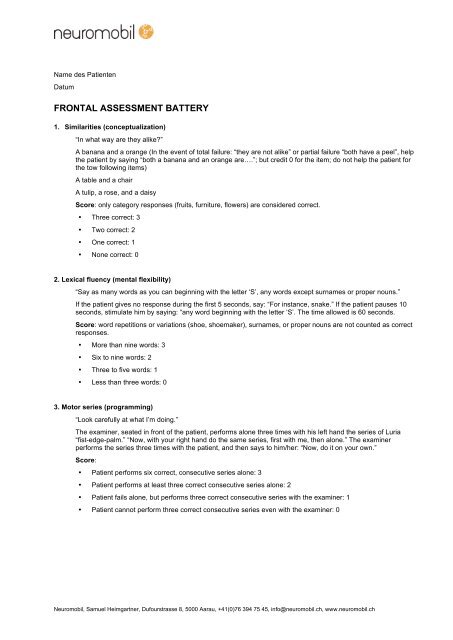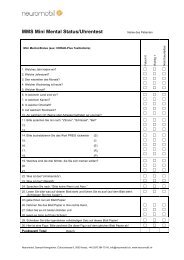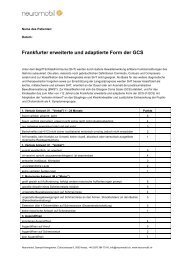Frontal Assessment - Neuromobil
Frontal Assessment - Neuromobil
Frontal Assessment - Neuromobil
- No tags were found...
You also want an ePaper? Increase the reach of your titles
YUMPU automatically turns print PDFs into web optimized ePapers that Google loves.
Name des PatientenDatumFRONTAL ASSESSMENT BATTERY1. Similarities (conceptualization)“In what way are they alike?”A banana and a orange (In the event of total failure: “they are not alike” or partial failure “both have a peel”, helpthe patient by saying “both a banana and an orange are….”; but credit 0 for the item; do not help the patient forthe tow following items)A table and a chairA tulip, a rose, and a daisyScore: only category responses (fruits, furniture, flowers) are considered correct.• Three correct: 3• Two correct: 2• One correct: 1• None correct: 02. Lexical fluency (mental flexibility)“Say as many words as you can beginning with the letter ‘S’, any words except surnames or proper nouns.”If the patient gives no response during the first 5 seconds, say: “For instance, snake.” If the patient pauses 10seconds, stimulate him by saying: “any word beginning with the letter ‘S’. The time allowed is 60 seconds.Score: word repetitions or variations (shoe, shoemaker), surnames, or proper nouns are not counted as correctresponses.• More than nine words: 3• Six to nine words: 2• Three to five words: 1• Less than three words: 03. Motor series (programming)“Look carefully at what I’m doing.”The examiner, seated in front of the patient, performs alone three times with his left hand the series of Luria“fist-edge-palm.” “Now, with your right hand do the same series, first with me, then alone.” The examinerperforms the series three times with the patient, and then says to him/her: “Now, do it on your own.”Score:• Patient performs six correct, consecutive series alone: 3• Patient performs at least three correct consecutive series alone: 2• Patient fails alone, but performs three correct consecutive series with the examiner: 1• Patient cannot perform three correct consecutive series even with the examiner: 0<strong>Neuromobil</strong>, Samuel Heimgartner, Dufourstrasse 8, 5000 Aarau, +41(0)76 394 75 45, info@neuromobil.ch, www.neuromobil.ch
4. Conflicting instructions (sensitivity to interference)“Tap twice when I tap once.”To be sure that the patient has understood the instructions, a series of three trials is run: 1 – 1 – 1. “Tap oncewhen I tap twice.” To be sure the patient has understood the instructions, a series of three trials is run: 2 – 2 –2. The examiner performs the following series: 1 – 1 – 2 – 1 – 2 – 2 – 2 – 1 – 1 – 2.Score:• No error: 3• One or two errors: 2• More than 2 errors: 1• Patient taps like the examiner at least four consecutive times: 05. Go-No-Go (inhibitory control)“Tap once when I tap once.”To be sure that the patient has understood the instructions, a series of three trials is run: 1 – 1 – 1. “Do not tapwhen I tap twice.” To be sure the patient has understood the instructions, a series of three trials is run: 2 – 2 –2. The examiner performs the series: 1 – 1 – 2 – 1 – 2 – 2 – 2 – 1 – 1 – 2.Score:• No errors: 3• One or two errors: 2• More than two errors: 1• Patient taps like the examiner at least four consecutive times: 06. Prehension behavior (environmental autonomy)“Do not take my hands.”The examiner is seated in front of the patient. Place the patient’s hands palm up on his/her knees. Withoutsaying anything or looking at the patient, the examiner brings his/her hands close to the patient’s hands andtouches the palms of both the patient’s hand, to see if he/she will spontaneously take them. If the patient takesthe hands, the examiner will try again after asking him/her: “Now, do not take my hands.”Score:• Patient does not take the examiner’s hands: 3• Patient hesitates and asks what he/she has to do: 2• Patient takes the hands without hesitation: 1• Patient takes the examiner’s hands even after he/she has been told not to do so: 0SCORE:____________Slachevsky, A; Dubois, B. <strong>Frontal</strong> <strong>Assessment</strong> Battery and Differential Diagnosis of Frontotemporal Dementia andAlzheimer Disease. Archives of Neurology. 61(7): 1104-1107, 2004.<strong>Neuromobil</strong>, Samuel Heimgartner, Dufourstrasse 8, 5000 Aarau, +41(0)76 394 75 45, info@neuromobil.ch, www.neuromobil.ch Seite 2











